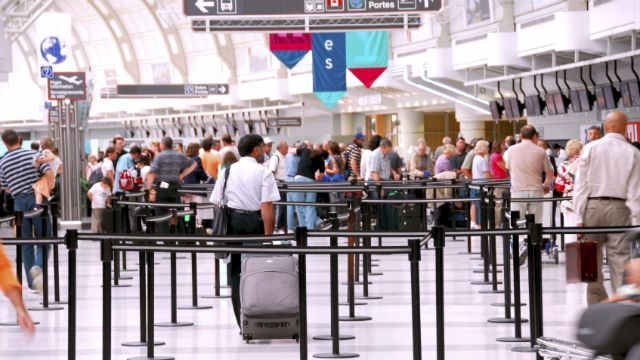
 Airplanes have long been known as a hotbed for germs – with all those people packed together on a single aircraft, one person coughing can infect the whole plane. The airport itself is a germ zone too: people from all over the world brushing past each other, gathering in packed lines and waiting rooms, can quickly transfer pathogens.
Airplanes have long been known as a hotbed for germs – with all those people packed together on a single aircraft, one person coughing can infect the whole plane. The airport itself is a germ zone too: people from all over the world brushing past each other, gathering in packed lines and waiting rooms, can quickly transfer pathogens.
Because some of the illnesses transmitted at airports are much more serious than a simple cough or cold, airports take measures to screen people at arrival, to make sure they are not sick. Typically, this includes watching for signs of a fever.
However, a new study performed by researchers at UCLA states that these screening methods are largely ineffective. The study, published in the journal eLife, highlights a lack of passengers’ honest reporting about their health as a major issue in the disease screening process.
For their study, the researchers used a mathematical model to take a closer look at the screening for six different viruses. These were: Ebola, SARS, Middle East respiratory syndrome coronavirus (MERS-CoV), Influenza H1N1, Influenza H7N9 and Marburg virus.
On their results, the study authors wrote:
“For pathogens with longer incubation periods, exposure risk detection dominates in growing epidemics, while fever becomes a better target in stable or declining epidemics. For pathogens with short incubation, fever screening drives detection in any epidemic stage. However, even in the most optimistic scenario arrival screening will miss the majority of cases.”
 Getting more specific, graduate student Katelyn Gostic, who was involved in the study, stated, “we found that for diseases with a long incubation period such as Marburg and Ebola, taking passengers’ temperature to test for fever is particularly ineffective at the start of an epidemic but does pick up more cases as it stabilises.”
Getting more specific, graduate student Katelyn Gostic, who was involved in the study, stated, “we found that for diseases with a long incubation period such as Marburg and Ebola, taking passengers’ temperature to test for fever is particularly ineffective at the start of an epidemic but does pick up more cases as it stabilises.”
Gostic explains that in the early phases of many epidemics, questionnaires given to travelers are the most effective method of disease detection – considering the travelers are honest. On this matter, Gostic adds, “we need to find ways to incentivise better self-reporting.”
While it may be a bit troubling to think about all the pathogens swarming around at the airport, there are steps you can take to protect yourself, and your immune system. A healthy immune system starts with a healthy lifestyle – check out our tips on how to keep yours in top shape.
Oh, and running around in a state of panic on your way to the airport certainly does not help your immune system at all – make sure to plan ahead so that your trip goes as smoothly as possible.
-The Alternative Daily
Sources:
http://elifesciences.org/content/4/e05564
http://www.eurekalert.org/pub_releases/2015-02/e-asm021815.php
https://www.thealternativedaily.com/7-things-stress-free-flight
https://www.thealternativedaily.com/six-surprising-facts-immune-system-boost-naturally

